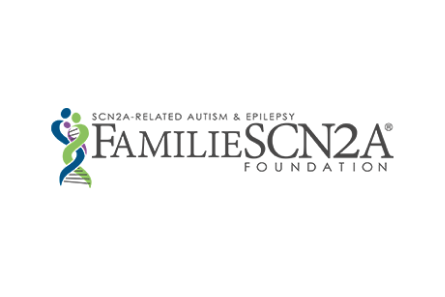FamilieSCN2A Foundation
Cycle 2
The SCN2A gene is located on the long (q) arm of chromosome 2 at position 24.3. SCN2A encodes instructions to make a protein in the brain called a sodium channel which plays a key role in a cell’s ability to generate and transmit electrical signals. Pathogenic variants that affect the SCN2A sodium channel impair the flow of sodium ions in the brain. A deletion or mutation of this gene can cause autism, epilepsy, and other neurological issues, such as movement disorders, dystonia, and dysautonomia.
Last updated 04/30/2025
Clinical
Disease Class
Genetic diseases
Neurological diseases
Body Systems
Nervous / Sensory
Organs
Adrenal glands
Bladder
Bones
Brain
Eyes
Heart
Intestines
Lungs
Muscles
Spinal cord
Stomach
Known Genetic Link
Yes, one or more genes directly cause the condition
causative_genes
SCN2A
contributory_genes
None specified / unknown
Type of Inheritance
Autosomal dominant
De novo
Newborn Screening
No, but we are in the process of requesting the addition of our gene(s)
Disease Mechanism(s)
Abnormal channel regulation
Abnormal protein degradation
Ion channel dysfunction
Pathogenic mutation
Age of Onset
Early childhood (age 1+-5)
Infancy (age 0-1)
Average Age at Diagnosis
Early childhood (age 1+-5)
Life Expectancy
Adulthood (age 18-64)
Affected Sex(es)
Female
Male
National Prevalence
10000+
Global Prevalence
10000+
National Incidence
11-50
Global Incidence
11-50
Symptoms / Phenotypes
autism
autistic behavior
behavioral changes
feeding difficulties
gastrointestinal disorders
hypotonia
movement disorders / ataxia / tremor
seizures / epilepsy
vision problems
Biomarkers
Diagnostic
· EEG
Monitoring
· EEG
Prognostic
· EEG
Therapeutic
· EEG, VOR
Existing Therapies
FDA-Approved for Symptom Relief
· ASM (sodium channel blockers for GoF & GABA targeting for LoF, CBD)
Organizational & Research
Cell Lines
Fibroblasts
iPSCs
Cell Lines, Institution
Cellectricon
Nationwide Childrens Hospital
Simons Foundation Autism Research Initiative (SFARI)
Cell Lines, Involvement
Consulted
Designed
Funded
Own
Cell Lines, share
Some of our cell lines are freely available
Disease Model
Mouse
Organoids
Rat
Disease Model, Involvement
Consulted
Designed
Funded
Own
Disease Model, share
Some of our disease models are freely available
Clinical Trial Role
Data sharing
Focus group
Funding
Meeting with regulators
Outcome measures, development
Patient and caregiver education
Recruitment and outreach, patients
Recruitment and outreach, trial sites/physicians
Results dissemination, publication
Study material design, review (not protocol)
Study protocol design, review
Biobank, Institution
Cellectricon
Nationwide Childrens Hospital
Simons Foundation Autism Research Initiative (SFARI)
Biobank, Involvement
Consulted
Designed
Funded
Own
Center of Excellence, Institution
Colorado Children's
UTHealth Houston (The University of Texas Health Science Center at Houston)
Center of Excellence, Involvement
Consulted
Designed
Endorsed/Certified/Accredited
Funded
Registry
Yes, we have a registry that we created
Data Collected, Registry
Genetic data
Longitudinal natural history data
Medication usage
Patient contact info
Patient-reported data
Data Entered by, Registry
Patients
Platform, Registry
IAMRARE
Natural History Study
Yes, we have a natural history study that we created
Data Collected, Natural History Study
Clinical endpoints (outcomes)
Electronic health records/electronic medical records
Genetic data
Imaging data
Medication usage
Patient-reported outcomes
Prospective data
Retrospective data
Platform, Natural History Study
IAMRARE
FDA Patient Listening Session
Yes
FDA Patient-Focused Drug Development (PFDD) Program
We have taken formal steps to schedule a meeting
ICD Codes
We are working on obtaining an ICD-10 code
Diagnostic Guidelines
Yes, we have published formal guidelines in a peer-reviewed journal
Science Advisory Board Policies
Yes, willing to share SAB policies
Research Network Policies
Not specified
Research Roadmap
Yes we have a Research Roadmap, and will share policies
International Chapters
Asia
International Partners
Europe
Middle East
North America
Oceania
South America
